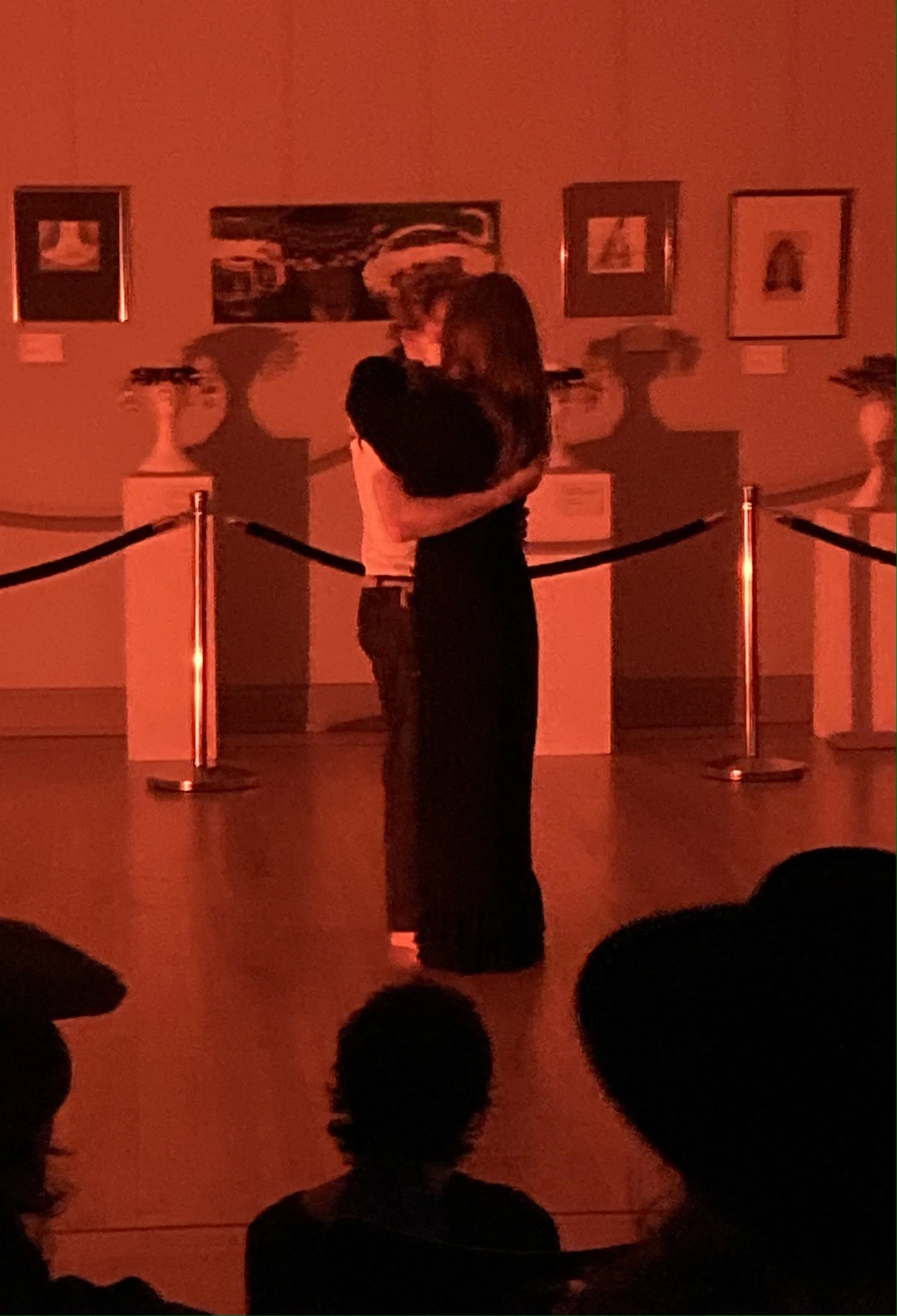Scene Report | January 3, 2022
Heliopause
Review of Aziah McConnell and Eva Meea’s
performance piece at the monca
by Jade Oates
It is dark in the museum. The chair behind the front desk is empty. The far gallery glows with warm light, and a small audience sits on folding chairs, in two short rows. In the soft spotlight, a couple sways in eternal embrace. Heliopause is 50 minutes of a synth-y, otherworldly chanting, and the couple swaying endlessly in a small circle. The tension is immense–I seem to hold my breath, I can hardly move in my chair, gripped by an undeniable electricity. The couple, wearing pandemic masks and simple clothes, does not appear particularly easy to identify as themselves; yet their enormous shifting shadows on the wall reveal them: The Lovers, in archetypal form.
The members of the audience further identify this specific incarnation of The Lovers. The man’s mother and father sit together in the back row. In the front row, in the middle, sits the proverbial “woman scorned”. She has, in a short time, become a symbol of the tragic lover whose man has left her–a modern Gaspara Stampa. As the performance goes on, she stares shamelessly, intensely at the spectacle, once letting out a small sob and occasionally wiping away tears. In her refusal to look away, she becomes a third player in the performance, or its heroic centerpiece.
I imagine what the sole museum worker thinks of all this, watching from the corner. She might call it self indulgent. Nothing happened, I imagine her telling her husband when she returns home.
True, and yet, this is one aspect of Love. When a couple comes together, their focus turns only to each other. They become separated from the group, more interested in a private intimacy than in the collective experience. That act of being set apart from the group naturally casts a certain light, much like a spotlight. You become the spectacle.
It is so common in our time now to “hide your love away,” as The Beatles once so cowardly recommended. Perhaps because people often find themselves in loves they don’t believe in, feel noncommittal or ashamed. Perhaps people hide love for the simple reason that they do not want to be set apart; some lovers fear the spectacle they create.
What was interesting then about Heliopause was not really in the performance itself, but in calling it a performance at all. This couple, set in tension with their society because of the nature of their union, has not shyly sought forgiveness or approval from their social sphere, piece by piece. Rather, they have put themselves inside a museum and invited you to come have a look. They have said: we are art. To call something art is both to call it sacred, and to open it up to the opinions of critics. There is a heroic, or Satanic, arrogance to it. They deem it beautiful. They please themselves. Come and see. Think what you like. And that small audience of their close community (parents, ex-lovers, friends) becomes a part of that performance, displaying in the starkest of terms, the very essence of what is happening.
At last, the music changes. “As The World Caves In” by Matt Maltese begins its ballad of romance in apocalypse. As the music rises now with tragic, heroic intensity, I want the couple’s dancing to become more dramatic, more expressive, more intense, but they are stubborn, swaying slowly in that same eternal embrace.
“It’s you that I lie with, as the atom bomb locks in,” Maltese croons. I have always loved this vision of two lovers embracing each other at the end of the world. Here is indicated a tragic facet of all romantic unions: the art created within is apparently inaccessible to everyone outside it.
I think of the end scene of Rogue One, which is my favorite Star Wars movie simply because of this scene. Two lovers, at the end of a heroic adventure, have destroyed the enemy’s headquarters, but will die themselves in the process. On the shore, watching the light of an immense explosion that will annihilate them in moments, they make their final embrace.
The beauty of this is in its intimacy and intensity. They appear so calm, so satisfied in their mission. There is a feeling that no one has ever been so together as those lovers are at that moment. Then the drama of their death transcends tragedy and becomes not a separation, but an ascent into an even more eternal union.



